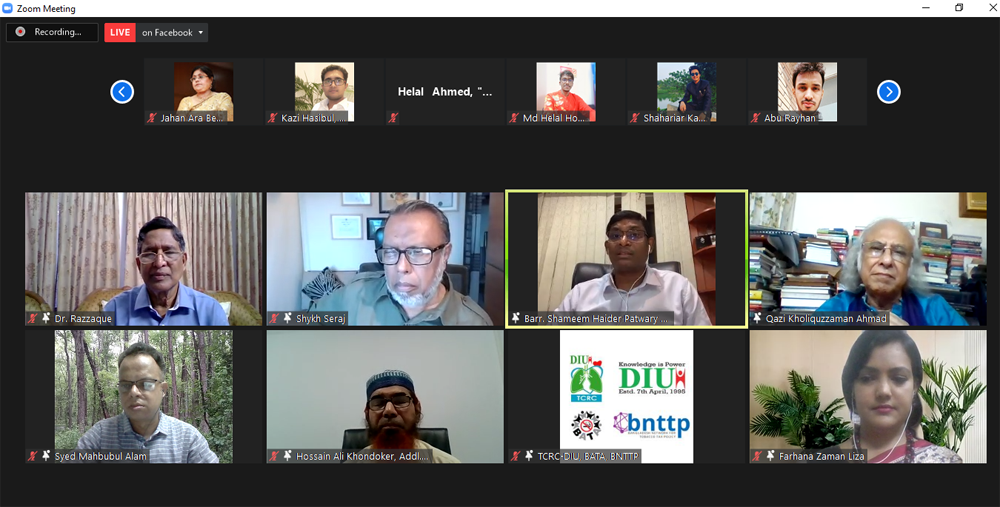News

Speakers at a webinar have said that it is necessary to finalize the policy to control tobacco cultivation in the interest of ensuring the health, environment and food security in the country.
Speaking at the function as the chief guest, Agriculture Minister Dr Muhammad Abdur Razzaque said that amount of agricultural land in the country is decreasing. Food security needs to be ensured in the limited space. “We have no any programme in favour of tobacco. The Agriculture Ministry is always making efforts to produce other agricultural products as an alternative to tobacco. If all of us work on a roadmap, it will be possible to make Bangladesh free from tobacco by 2040,” he said.
Tobacco Control and Research Cell (TCRC) of Dhaka International University, Bangladesh Network for Tobacco Tax Policy (BNTTP) and Bangladesh Anti-Tobacco Coalition (BATA) jointly organized the webinar on ‘Responsibilities to Control Tobacco Cultivation and Promote Food Production’ on Monday (July 12). Representatives of national, international and local level anti-tobacco organisations from across the country and more than two hundred teachers and students of Dhaka International University joined the webinar.
Barrister Shameem Haider Patwari, MP, presided over the webinar, while it was addressed, among others, by president of Palli Karma Sahayak Foundation Dr Kazi Khaliquzzaman Ahmed, coordinator of National Tobacco Control Cell Hossain Ali Khondakar, media personality Shykh Seraj, acting VC of Dhaka International University Prof Dr Ganesh Chandra Saha, head of program of Vital Strategies Md Shafiqul Islam, Lead Policy Advisor of CTFK Md Mostafizur Rahman, BATA’s coordinator Saifuddin Ahmed and Executive Director of UBINIG Farida Akhter.
Technical Adviser of The Union Advocate Syed Mahbubul Alam Tahin presented the main keynote, while Research Assistant and Program Manager of TCRC moderated the event.
In his keynote, Syed Mahbubul Alam said that tobacco cultivation affects the fertility of agricultural land, environment, biodiversity and health of farmers. The farmers need to be provided assistance in cultivating alternative crops to curb the harmful tobacco cultivation. For this reason, it is now the demand of time to formulate a policy to control the tobacco cultivation in the country, he added.
Barrister Shameem Haider Patwari said that the tobacco cultivation has been stopped in developed countries to protect the environment, public health and biodiversity. As a result, international tobacco companies have expanded their tobacco cultivation project in the countries like Bangladesh. “They are polluting our soil, water and air. It is important to formulate tobacco control policy to protect our agricultural land,” he added.
Dr Kazi Khaliquzzaman Ahmed said, “We have been demanding for a long time to increase the price of tobacco. However, the price and tax on tobacco products are not increased as per our demand due to the intervention of the tobacco companies. The Agriculture Ministry should work with the responsibility to control the tobacco cultivation.”
Shykh Seraj said, “If we want to make the country free from tobacco by 2040, we have to control the tobacco cultivation. We need a tobacco cultivation policy to build a tobacco free Bangladesh.”
Farida Akhter said that the tobacco companies don’t cultivate tobacco in an area for a long time. In order to maintain the quality of tobacco, it has to be shifted to the fertile land for tobacco cultivation. Most of the time, they target land along the river. As a result, river water and biodiversity are being damaged, she added.
She further said that a total of 52 types of high level pesticides and fertilizers are used for tobacco cultivation in Rangpur area alone. These high levels of pesticides are creating health risks for farming families, while the biodiversity is under threat.
